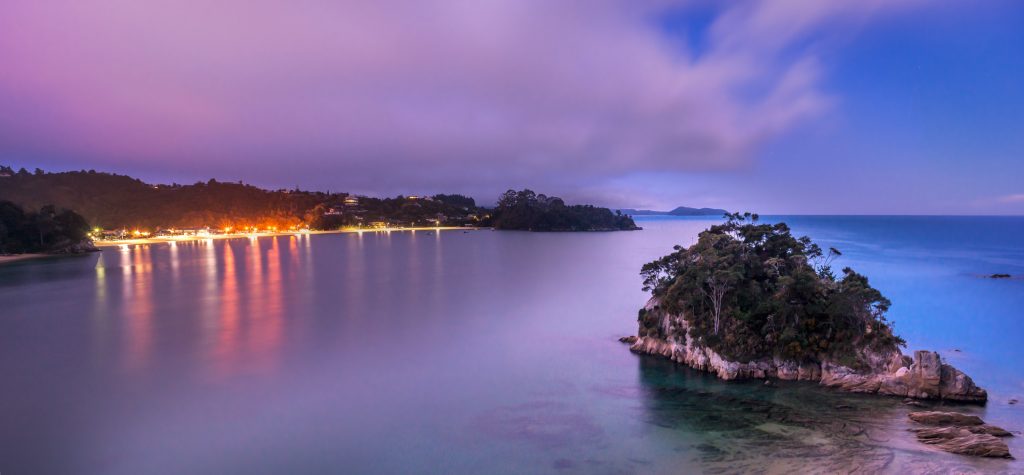
BY SARAH NOTTAGE | Photo Oliver Weber
My first sight of the golden crescent of Kaiteriteri Beach was as a six-year-old lily-white Londoner with feet as soft as the inside of a kina. Legs sticking to the vinyl seat of my grandparents’ 1969 Austin Maxi, I felt like I was riding a snake along the winding road. As I absorbed the richly hued blue, green and golden landscape while searching glistening rock pools for crabs, my city eyes adjusted. I remember the sun on my shoulders, the salt on my lips, the sting as I stubbed my toe. I became a Kiwi kid that day.
We all have rich memories of Kaiteriteri – it is part of our history and belonging; part of our story. However, perhaps because it is our backyard, we take it for granted. We assume this coastal gateway to the Abel Tasman National Park will always be full of golden, groomed sand and clear of rubbish. We may believe the local businesses are privately owned; that the bosses go back to their luxurious homes at the end of summer with full pockets. However, this narrative couldn’t be further from the truth. Governed by an active, enthusiastic board appointed by and accountable to the Minister of Conservation, the Kaiteriteri Recreation Reserve (‘The Reserve’) is responsible for directing and monitoring 250ha of Crown land. This includes Kaiteriteri Beach, Kaka Point Historic Reserve, Kaka Island, the estuary, mountain bike park and surrounding hills. The Reserve owns and operates the campground, apartments, store, Kai & Gone Burgers restaurants and mountain bike park. Although they are a Crown entity, they don’t receive government funding and are non-profit – 100% of their business profit is invested back into the Kaiteriteri Recreation Reserve, in accordance with a ministerial-approved management plan.
One of seven world-wide
With the vision of being New Zealand’s premier coastal recreation destination, The Reserve works tirelessly with community groups and experts to protect and preserve this natural adventure wonderland in perpetuity. “We trap pests, maintain walking tracks, collect rubbish, groom the beach,” says Ali Kimber, marketing manager. “We are regenerating the Kaiteriteri Mountain Bike Park and the rear of the estuary with native trees, and recently planted kanuka along the beach front.” With the support of a local couple, The Reserve is funding a penguin repopulation programme and encourages visitors not to bring their dogs to Kaiteriteri, to protect the local wildlife. The Reserve also has to manage and finance the fallout from significant environmental events. “When Cyclone Gita hit in 2018 and our beach was washed away, we used our environmental disaster funds to replace the sand,” says Ali.
The mountain bike park is one of only seven worldwide with gold level status as accredited by the International Mountain Biking Association. “We love seeing people of all ages refuelling after a big day biking – there aren’t many places where you can get a treat at the bottom of the hill – especially with burgers named after the trails you have just ridden.” The Reserve supports local produce as much as possible; “You will always find fresh local fish, seafood, beer and wine in our Kai Restaurant,” says Ali.
The Reserve acknowledges that the beachfront is at saturation point building wise, but that some of the older buildings need an uplift. Ali says: “We intend to maintain a beachy, relaxed feel, drawing your eye out to the sea.”
A priority for The Reserve is education. “We work with school groups and local initiatives to teach them about the unique marine and land environment at Kaiteriteri.” Ali says that children leave at the end of the day brimming with passion for their precious natural environment.
The Kaiteriteri Recreation Reserve encourages people of all ages to visit and enjoy what the area has to offer all year round.
